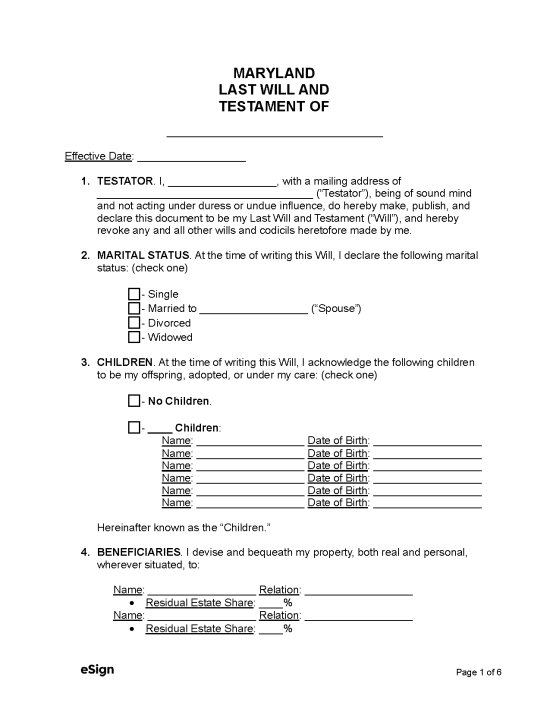

A Maryland last will and testament conveys the testator’s wishes for how their assets should be distributed following their death. The document appoints a personal representative who will make sure debts get settled and property/money goes to the right beneficiaries. Having a will in place provides the testator (person who creates the document) control over how their property will be divided instead of leaving it in the state’s hands.
Wills may be executed by legally competent individuals at least 18 years old. [1]
Holographic Wills – Handwritten wills made outside the U.S. by members of the armed forces are valid for a year after discharge, with or without witnesses. [2] All other wills must be witnessed.
Revocation – A will may be revoked in the following circumstances: [3]
Signing Requirements – Wills must be signed by the testator and two credible witnesses in the testator’s presence. [4]
In Maryland, there is no deadline after the decedent’s death for starting the probate process. It is nonetheless recommended to file for probate in a timely manner to avoid any complications.
The following is meant to be a general overview of the probate process. It is recommended that executors/personal representatives consult with an attorney if they’re unsure of any step.
Estates with a total value of $50,000 or less ($100,000 if the surviving spouse is the only beneficiary) can avoid probate and be distributed using the Petition for Administration of a Small Estate (commonly referred to as a “small estate affidavit”). [5]
To open an estate, the following will need to be provided to the Register of Wills of the county where the decedent last resided: [6]
Once the documents are approved, the personal representative will be issued the Letters of Administration, granting them authority to administer the estate.
The newspaper that published Form 1114 will provide the personal representative with a notice of appointment. Copies of the notice should be provided to the Register within 20 days of their appointment, as the Register will distribute them to interested parties. The personal representative must also make efforts to identify creditors and deliver each a copy.
Note : Creditors must present claims within six months from the decedent’s passing or two months after being served the notice, whichever is earlier.
The personal representative must complete and file the Inventory (Forms 1122 and 1123) within three months of their appointment. If the estate had assets not fully owned by the decedent, the Information Report (Form 1124) must also be filed.
An account must be prepared and filed within nine months of appointment, though the Register does not provide an official form. The account must include:
If the account is not final, an updated version must be filed at whichever interval occurs first: six months from the previous account’s approval or nine months from its filing.
Furthermore, a notice of the account containing the details in the sample account’s verification must be served on interested persons.
If the total estate value equals or exceeds $5,000,000, an estate tax is levied on assets transferred to other parties. [8] , [9] If applicable, within nine months of the decedent’s death, the personal representative must complete IRS Form 706 and Form MET-1 and mail both forms with the will and certified death certificate to:
Comptroller of Maryland
Estate Tax Section
P.O. Box 828
Annapolis, MD 21404-0828
The Register collects an inheritance tax of 10% of the transferred property’s value, though it is not imposed on transfers to immediate or step-family members or transfers of $1000 or less. [10] , [11] The inheritance tax is deducted from the estate tax, and the difference is the estate tax due. If the inheritance tax is equal to or exceeds the estate tax, no estate tax is owed. If applicable, the inheritance tax is due upon the estate’s distribution in the next step.
In addition to the above taxes, revenue generated by an estate is subject to federal and state income taxes; if applicable, IRS Form 1041 must be filed with the IRS, and Form 504 should be filed with the Comptroller of Maryland.
The Register will audit the final account and issue an order of approval if everything is in order. The estate must be distributed within 30 days following the court’s order. Upon the court’s approval of the final account, the estate is officially closed.